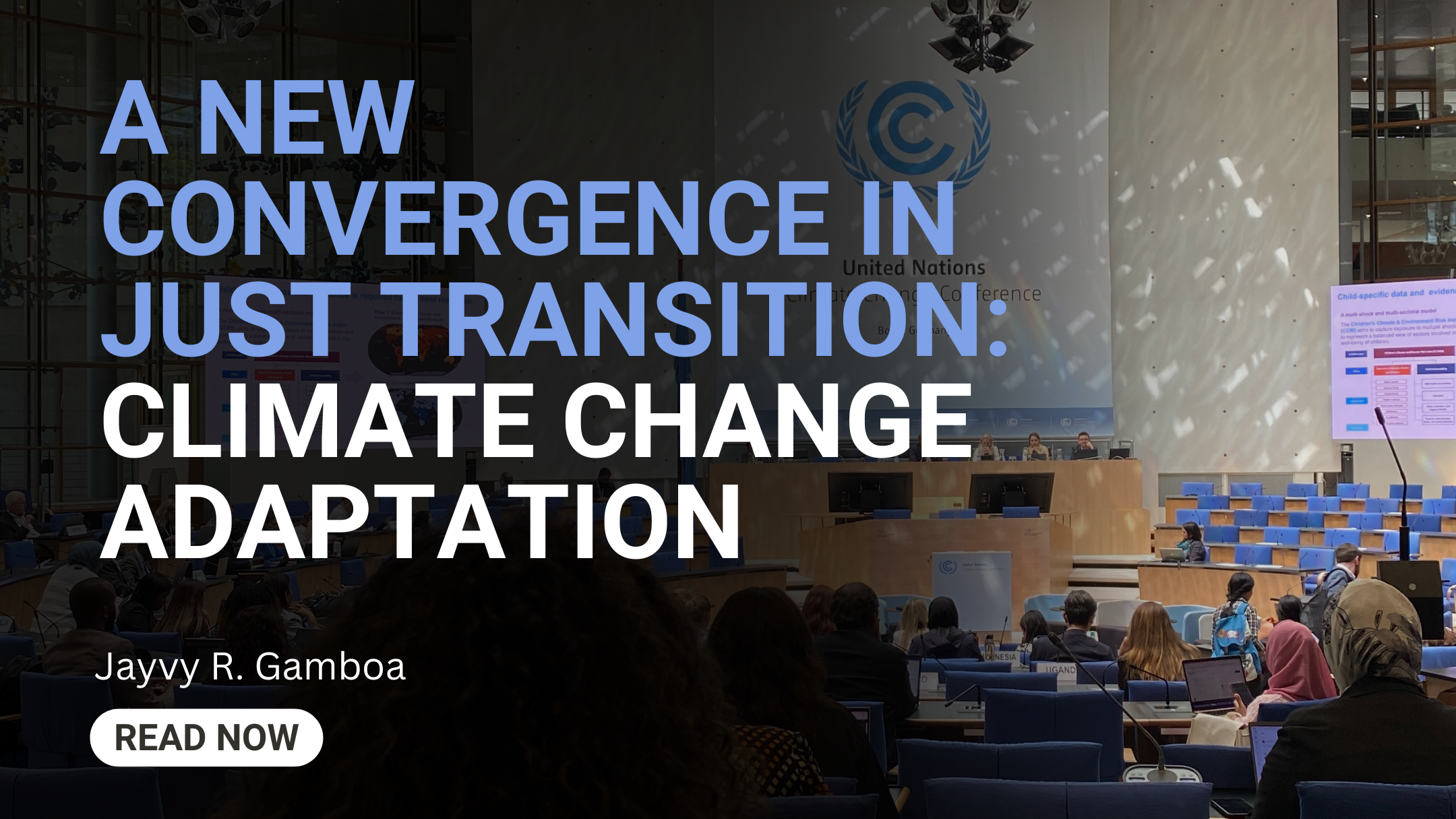Jayvy R. Gamboa
The June 2024 UN Climate Change Meetings in Bonn, Germany witnessed the coming into action of the UAE Just Transition work programme, which was adopted at COP 28 (2023) in Dubai. From co-facilitators, co-chairs now lead the Parties. From a mere possibility, the work programme is now a staple in the agenda. Twice-a-year Dialogues on various topics related to just transition are also mandated now.
Despite this clear progress in negotiations and mainstreaming, it has yet to be seen whether the work programme remains a mere mechanism in the political grind, or it becomes a transformative space where meaningful action and outcomes begin.
State of negotiations in Just Transition work programme
During the Climate Change Meetings, the work programme had two agenda items: first, a review of the conduct of the Dialogues; and second, continuing negotiations on the implementation of the work programme.
Similar to other institutionalized Dialogues within the climate process, the recurring issue as articulated by the Parties is how their outcomes can contribute to the negotiations. The underlying intention is clear. For action-driven Parties, it is important that the Dialogues do not remain an avenue for presentations or country statements, but actually contribute to unearthing of issues on the work programme toward the ultimate goal of negotiations. For the Just Transition work programme, another key issue during the June meetings is the selection of topics and the increased participation of non-Party stakeholders from developing countries.
On the other hand, the negotiations on furthering the implementation of the work programme took a huge hit. The Parties were not able to agree to carry any draft decision for consideration in COP 29 in Baku. Contentious issues include the creation of a work plan for the work programme, which could set particular targets in negotiations, and balance of the work programme elements as mandated by the Dubai decision.
During the discussions, however, one of the substantive issues that Parties seem to converge into is that just transition as an agenda in international climate negotiations and the work programme itself should not be ‘mitigation-centric’.
Not ‘mitigation-centric’
This is not new, at least for the Parties. In the 2023 Dubai decision, the elements of the work programme include: “(c) Opportunities, challenges and barriers relating to sustainable development and poverty eradication as part of transitions globally to low emissions and climate resilience, taking into account nationally defined development priorities;” and “(d) Approaches to enhancing adaptation and climate resilience at the national and international level[.]”
These seem a broadening of the usual suspect of just transition discourse. Just transition is usually viewed from the perspective of mitigation, or the transition to low-carbon economy as well as systems transformation, which requires the sun-setting of carbon-intensive systems and the creation of systems reliant on more sustainable sources of energy, to meet the Paris Agreement’s temperature goal.
Considerations of just transition in mitigation include the equitable distribution of costs and benefits among stakeholders while ensuring that workers in the affected systems, frontline communities that rely on such systems, and vulnerable sectors are not left behind. Social protection, social dialogue, and mechanisms to achieve these are also integral.
Now that just transition in adaptation is increasingly taking the space in negotiations and molding the narrative, it begs the question of whether it deserves a new framework of understanding and new demands for what justice looks like, and what may be the implications of this development both in the international and national adaptation efforts.
Prospects and implications of just transition in adaptation
The concept of maladaptive actions or maladaptation, or the “potentially adverse effects of certain forms of adaptation action, such as increased GHG emissions or increased vulnerability to climate change and diminished welfare of certain parts of a population now or in the future[,]” may be used as a starting point. For instance, just transition in adaptation efforts may have the prevention of maladaptation as an overarching goal. Thus, to some extent how adaptation is thought of and practiced today, by recognizing its potential unintended consequences and by ensuring that these are prevented in the process, already has just transition considerations.
Certainly, these can be applied in adaptation efforts that are still in the pipeline and are still yet to be implemented. How about those that have already been instituted or built, in terms of infrastructure, that actually lead to maladaptation? How can these be transitioned?
Drawing from the lessons of just transition in mitigation, the sun-setting of maladaptive actions and the creation of new ones in lieu of these is a scenario worthy of consideration. Some guiding questions may arise: How can workers, frontline communities, and vulnerable sectors who rely on such maladaptive actions be transitioned? Is a rethinking of currently existing just transition strategies (e.g. forms of social protection) in the mitigation literature needed? What should justice look like in such transition?
These are some questions to which answers need more investigation. On a conceptual level, whether there is a need for a new normative framework for just transition in adaptation, which builds upon the existing understandings of maladaptation, and what justice aspects or considerations it includes is certainly ripe for future research on just transition.
On an operational level, notwithstanding the novelty of these questions, the international community can definitely consider these in furthering negotiations on just transition and in complementarity with the negotiations on the Global Goal on Adaptation. Meanwhile, the Parties can gradually integrate these in implementing their nationally determined adaptation plans.
Atty. Jayvy R. Gamboa is Assistant Director for Policy and Governance at the Klima Center of the Manila Observatory. He is working on just transition in international, national, and local levels of governance and has published research on this area with a focus on governance mechanisms, law and accountability, and social justice.
This is part of Klima Center’s SB 60 thought-leadership series on the climate change workstreams of Global Stocktake, Mitigation, Loss and Damage, Just Transition, and Action for Climate Empowerment.

